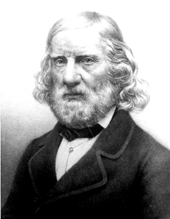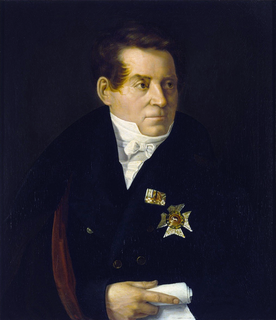
August WilhelmSchlegel, usually cited as August Schlegel, was a German poet, translator and critic, and with his brother Friedrich Schlegel the leading influence within Jena Romanticism. His translations of Shakespeare turned the English dramatist's works into German classics. Schlegel was also the first professor of Sanskrit in Continental Europe and produced a translation of the Bhagavad Gita.
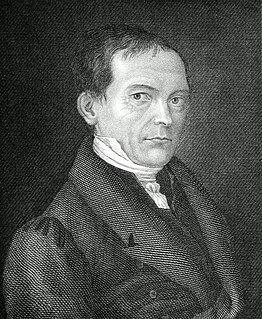
Wilhelm Martin Leberecht de Wette, was a German theologian and biblical scholar.
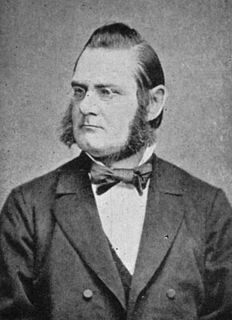
Eberhard Schrader was a German orientalist primarily known for his achievements in Assyriology.

Rudolf Christoph Eucken was a German philosopher. He received the 1908 Nobel Prize for Literature "in recognition of his earnest search for truth, his penetrating power of thought, his wide range of vision, and the warmth and strength in presentation with which in his numerous works he has vindicated and developed an idealistic philosophy of life", after he had been nominated by a member of the Swedish Academy.

Heinrich Leberecht Fleischer was a German Orientalist.

Karl Leberecht Immermann was a German dramatist, novelist and a poet.

Friedrich Conrad Dietrich Wyneken was a missionary pastor in the United States. He also served for fourteen years as the second president of the Lutheran Church–Missouri Synod, and helped found and was the first president of Concordia Theological Seminary.

Heymann or Hermann Steinthal was a German philologist and philosopher.
The Gustav-Adolf-Werk (GAW) is a society under the roof of the Evangelical Church in Germany which has for its object the aid of feeble sister churches and congregations. It is responsible for the taking care of the Diasporawork of the EKD, in cooperation with the EKD itself, its member churches and congregations. The organization started with a focus on the diaspora, but has separate branches internationally in the meanwhile. The organization in Austria is still called the Gustav-Adolf-Verein, which was the original name in Germany as well. Further terms used for the GAW in the past include Gustavus Adolphus Union, Gustav-Adolf-Stiftung and Evangelischer Verein der Gustav-Adolf-Stiftung.

Hermann Ulrici was a German philosopher. He was co-editor of the philosophical journal Zeitschrift für Philosophie und philosophische Kritik. He also wrote under the pseudonym of Ulrich Reimann.
The German Catholics were a schismatic sect formed in December 1844 by German dissidents from the Roman Catholic Church, under the leadership of Johannes Ronge. The movement originated in Breslau. They were joined for a time by somewhat more conservative dissidents under the leadership of Johannes Czerski. This latter movement took the name of Christian Catholics and originated in Schneidemühl.
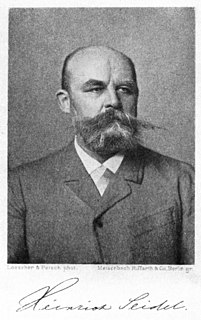
Heinrich Friedrich Wilhelm Seidel was a German engineer, poet and writer.

John Henry Luers was nominated first bishop of Fort Wayne, Indiana, and consecrated in Cincinnati, Ohio, 10 January 1858.
Christoph Ludolf Ehrenfried Krehl was a German orientalist born in Meissen.

David Friedrich Strauss was a German liberal Protestant theologian and writer, who influenced Christian Europe with his portrayal of the "historical Jesus", whose divine nature he denied. His work was connected to the Tübingen School, which revolutionized study of the New Testament, early Christianity, and ancient religions. Strauss was a pioneer in the historical investigation of Jesus.
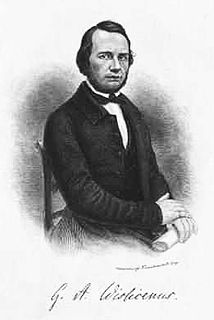
Gustav Adolf Wislicenus was a German theologian, one of the leaders of the Free Congregations.

Johann Konrad Wilhelm Löhe was a pastor of the Lutheran Church, Neo-Lutheran writer, and is often regarded as being a founder of the deaconess movement in Lutheranism and a founding sponsor of the Lutheran Church–Missouri Synod (LCMS). From the small town of Neuendettelsau, he sent pastors to North America, Australia, New Guinea, Brazil, and the Ukraine. His work for a clear confessional basis within the Bavarian church sometimes led to conflict with the ecclesiastical bureaucracy. His chief concern was that a parish find its life in the eucharist, and from that source evangelism and social ministries would flow. Many Lutheran congregations in Michigan, Ohio, and Iowa were either founded or influenced by missionaries sent by Löhe. He is commemorated on 2 January by the calendars of both the LCMS and the Evangelical Lutheran Church in America.
Friedrich Wilhelm Hermann Wagener was a Prussian jurist, chief editor of the Kreuzzeitung and was a politician and minister from the Prussian Conservative Party.

Ludwig Andreas von Feuerbach was a German philosopher and anthropologist best known for his book The Essence of Christianity, which provided a critique of Christianity which strongly influenced generations of later thinkers, including Karl Marx, Sigmund Freud, Friedrich Engels, Richard Wagner, and Friedrich Nietzsche.
